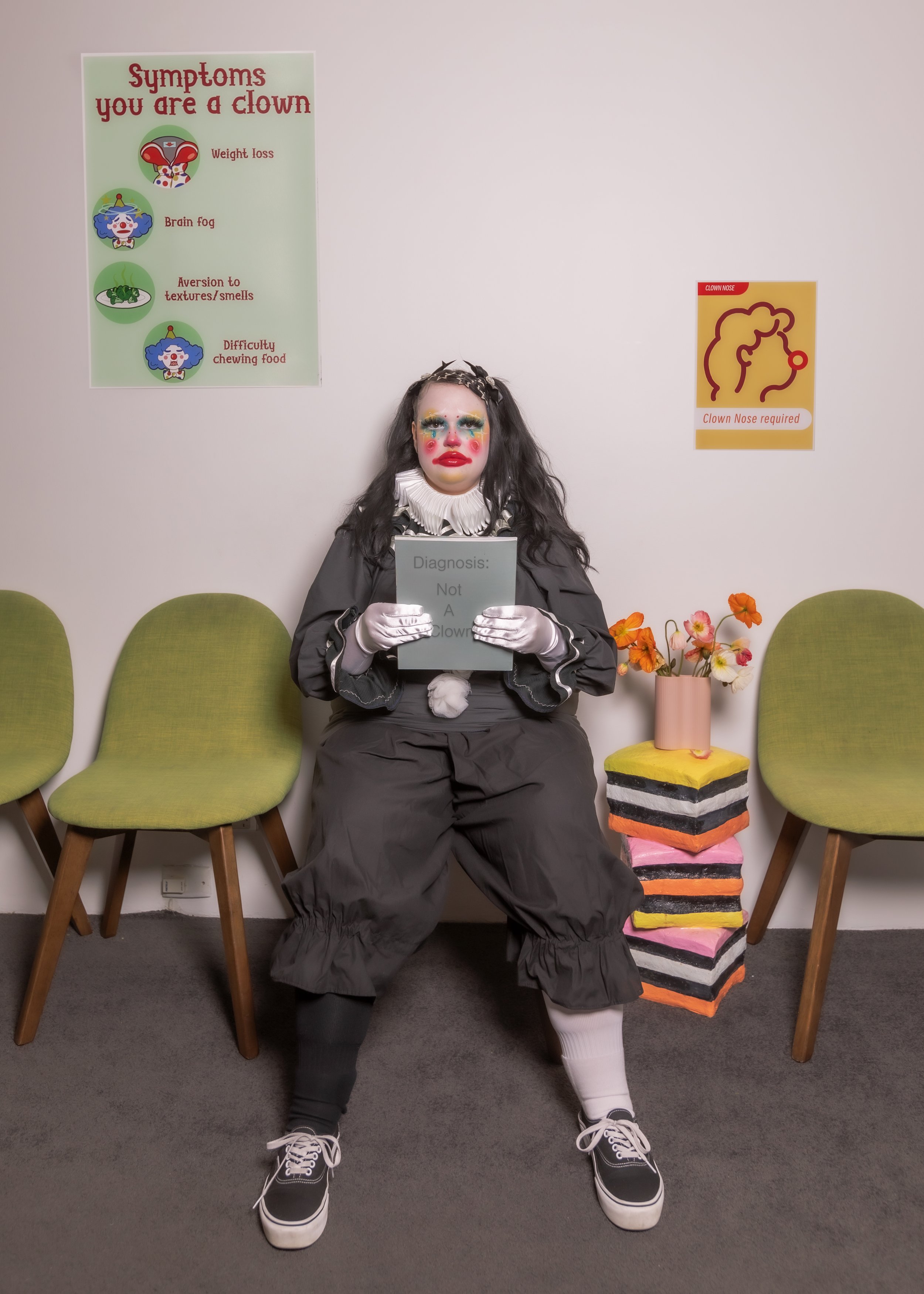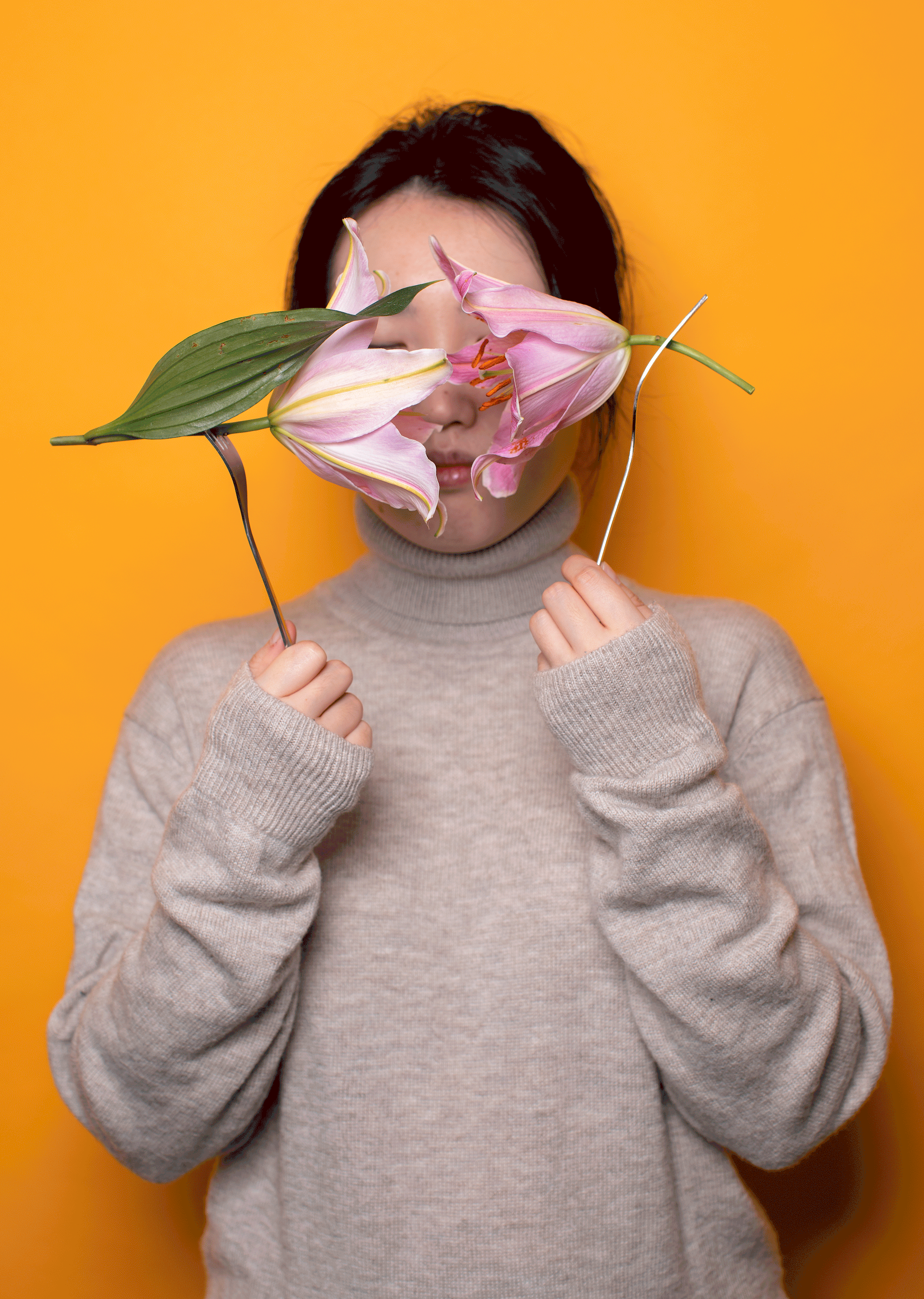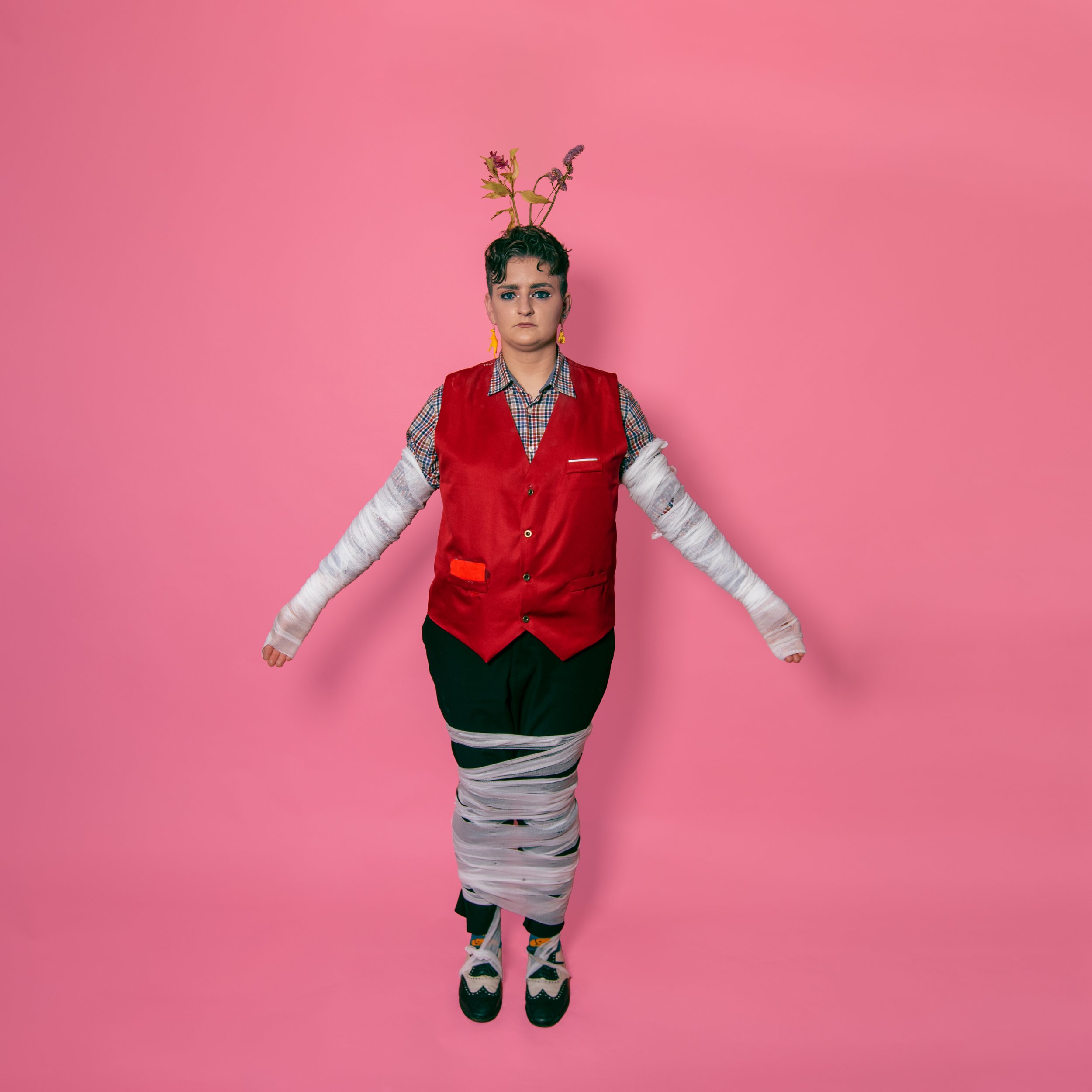Get well soon: Questioning medical and social
bias through photographic practices, 2024
“Diagnosis of endometriosis is often delayed, with an average of between 6 and 8 years between onset of symptoms and diagnosis” - as quoted by The Australian Institute of Health and welfare.
Get well Soon: Questioning medical and social bias through photographic practices is a queer feminist photographic series using collaboration between myself and the models through discussing their health experiences and then adapting their symptoms/ experiences through performative kitsch aesthetics within digital staged photographs.
The images depict an array of health experiences both mental and physical from Endometriosis, Polycystic Ovaries, Lesion on the brain, Chronic headaches to Dissociative Identity disorder, depression and Obsessive compulsion disorder. Unfortunately AFAB people often face the difficulty of being misdiagnosed, dismissed which can become costly both causing further physical and mental illness as well as financial issues from both having to take time off work or for having to seek out multiple medical practitioners for advice.
This topic is a ongoing global issue for AFAB bodies this is made evident by the array of artwork made on the topic inspiring the series “get well soon” includes Georgie Wileman “This is endometriosis”, Frida Kahlo self portraits surrounding her experiences with miscarriage and ongoing health issues such as Polio and Alannah Dair with her sculptural fabric work based on invasive surgery to check for endometriosis.
Visual inspiration for the work can be found in Juno Calypso and Mia Mala Mcdonald artistic work with their similar use of studio lighting in a location setting as well as bold colourful imagery.
Making the work intractable by picking up the cards and reading them allows for the photographs to be viewed in a more personal way you can connect more deeply with each individual and their experiences.
Foucults knowledge equals power is the methodology focused on in the work. Power is gained from the audience and models as they understand the lived experience of chronic illness but simultaneously power is gained from educating the audience on the topic as the more people are aware of the issues AFAB people face the more likely we will be able to advocate for change within the medical world.

Text inside card Migraine and tension headaches. Temporomandibular joint dysfunction (TMJ) Main Symptoms: Intense pressure/ pain in head, Regular headaches, Lingering migraine throb, Dizziness, nausea. Light sensitivity.

Text inside card: Endometriosis, Obsessive-compulsive disorder (OCD) and borderline personality disorder (BPD) Main symptoms: severe and sometimes debilitating cramping. Bloating, Heavy periods. Out of body experiences, not quite recognising myself or my behaviour, Can be easily triggered and find it hard to regulate, Insomnia, Excessive anxiety

Text inside card: Complex post-traumatic stress disorder (CPTSD), bipolar, OCD, ADHD , Autism Main symptoms: Feelings of Shame, Guilt, mourning of ones childhood, Anxiety Depersonalisation, Isolation, Avoidance, Detachment , Racing thoughts, cyclic mood changes, sleep problems, Struggling with self care, Feelings of being different.

Text inside card: Endometriosis, Fibromyalgia, Dyspraxia, Autism, ADHD, Chronic depression. Main symptoms: Chronic pain in Back, Neck, Hips, Pain increases with pressure, Headaches, Cramps, Clumsiness, Adjusted movements to accommodate chronic pain, Dismissal of health issues due to weight.

Text inside card: Bipolar disorder, ADHD, autism, gender dysphoria, Polycystic ovary syndrome (PCOS) Main symptoms: Depression, Anxiety, fluctuating extreme high moods, Low moods, Insomnia, Overwhelm friends and family with fluctuation, feelings of doom, Crying, temporary Suicidal ideation, hereditary

Text inside card: Depression, Anxiety, Eating Avoidant/restrictive food intake disorder (ARFID) Main Symptoms: Avoid eating around others, Dismissed symptoms due to weight, Passing out, Aversion to textures in food, Aversion to smells, Vegetarian due to discomfort of meat, Discomfort of eating at Friends/ Families homes due to complexities of restricted diet.

Text inside card: Lesion on brain Main Symptoms: Vision blacking out, Sensitivity to light, dizziness, Nausea and hearing problems.

Text inside card: Dissociative Identity Disorder (DID), Complex post-traumatic stress disorder (C-PTSD), Autism, Polycystic ovary syndrome (PCOS), Depression. Main Symptoms: Dissociation, difficulty perceiving what is reality, Questioning identity, Nine Alternate Identities, Skillsets vary between identities, Blood sugar fluctuating needing to constantly test, Feelings of doom, Dismissal of PCOS symptoms due to being Trans.

Text inside card: Complex post-traumatic stress disorder (C-PTSD} , PCOS, ADHD, Migraine. Main Symptoms: Chronic pain, Anxiety, Burning Joint and nerve pain, Fainting, Nausea.
First Site Gallery - Masters of Photography 2024 Graduate exhibition. Image credit: lê Nguyên Phoúóng
First Site Gallery - Masters of Photography 2024 Graduate exhibition. Image credit: lê Nguyên Phoúóng
First Site Gallery - Masters of Photography 2024 Graduate exhibition. Image credit: lê Nguyên Phoúóng
Bibliography:
Alannahdair.com. (2024). Alannah Dair. [online] Available at: https://alannahdair.com [Accessed 5 Nov. 2024].
Australian Institute of Health and Welfare. (2023). Endometriosis, Endometriosis. [online] Available at: https://www.aihw.gov.au/reports/chronic-disease/endometriosis-in-australia/contents/endometriosis#.
Henri Matisse. Frida Kahlo. [online] Available at: https://www.fridakahlo.org.
junocalypso. junocalypso. [online] Available at: https://www.junocalypso.com.
Portrait Photographer (2024). Mia Mala McDonald. [online] Mia Mala McDonald. Available at: http://www.miamalamcdonald.com/people [Accessed 5 Nov. 2024].
Wileman, G. (2014). Georgie Wileman. [online] Georgie Wileman . Available at: https://www.georgiewileman.com/this-is-endometriosis-1.



